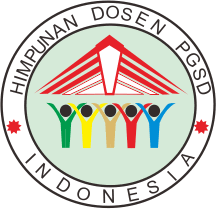Analisis keterampilan sosial dalam dimensi hubungan teman sebaya pada buku ajar IPAS SD Kelas IV
Abstract
The aim of the study was to describe the social skills in peer relations contained in the textbooks of Natural and Social Sciences (IPAS) for fourth grade students in the Merdeka Curriculum. This research is included in the type of content analysis research. This research is a descriptive qualitative research, this is because this research describes the reality of social skills in peer relations. Data collection techniques used were document inspection and interviews. Data validity testing techniques use techniques to increase persistence and use content validity of logical validity types. This study uses the interactive data analysis technique of the Miles and Huberman model. The results of the study concluded that social skills in peer relations which consisted of indicators of positive interaction with peers and having empathy with peers were included in the learning activities in the Natural and Social Sciences textbooks for fourth grade students of Merdeka Curriculum Elementary School. However, the level of domination of the development of each indicator of social skills in peer relations varies. Overall, the development of social skills in peer relations in the Natural and Social Sciences Textbook for Grade IV students at Merdeka Curriculum Elementary School has an unequal and uneven distribution pattern.
Keywords
Full Text:
PDFReferences
P. Caldarella, R. A. A. Larsen, L. Williams, J. H. Wehby, H. Wills, and D. Kamps, “Monitoring academic and social skills in elementary school: A psychometric evaluation of the Classroom Performance Survey,” J. Posit. Behav. Interv., vol. 19, no. 2, pp. 78–89, 2017. [2] G. W. Ladd, E. S. Buhs, and M. Seid, “Children’s initial sentiments about kindergarten: Is school liking an antecedent of early classroom participation and achievement?,” MerrillPalmer Q., pp. 255–279, 2000. [3] E. Dereli, “Examining the permanence of the effect of a social skills training program for the acquisition of social problem-solving skills,” Soc. Behav. Personal. an Int. J., vol. 37, no. 10, pp. 1419–1427, 2009. [4] A. Sukmaningsih, “Eksistensi penerimaan teman sebaya bagi penguatan keterampilan sosial siswa,” J. Civ. Soc. Stud., vol. 5, no. 1, pp. 65–79, 2021. [5] S. N. O. Kasim, “Pengembangan panduan permainan tradisional bugis-makassar dalam meningkatkan keterampilan sosial Siswa,” J. Psikol. Pendidik. dan Konseling, vol. 3, no. 1, 2017. [6] F. Fahreza and R. Rahmi, “Peningkatan keterampilan sosial melalui metode role playing pada pembelajaran IPS di kelas IV SD Negeri Pasi Pinang Kabupaten Aceh Barat,” Bina Gogik J. Ilm. Pendidik. Guru Sekol. Dasar, vol. 5, no. 1, 2018. [7] N. Rut, R. L. Gaol, A. R. Abi, and P. Silaban, “Pengaruh Permainan Tradisional Terhadap Keterampilan Sosial Anak Sd,” J. Educ. FKIP UNMA, vol. 6, no. 2, pp. 449–455, 2020. [8] A. L. Aguiar, C. Aguiar, J. Cadima, N. Correia, and M. Fialho, “Classroom quality and children’s social skills and problem behaviors: Dosage and disability status as moderators,” Early Child. Res. Q., vol. 49, pp. 81–92, 2019. [9] Y. Y. Yulistiani, “Analisis Keterampilan Sosial Pada Buku Siswa Ips Sekolah Dasar,” Janacitta, vol. 4, no. 1, 2021, doi: 10.35473/jnctt.v4i1.914. [10] M. Agustin Ningrum and A. Mahendra R. K. Wardhani, “Pengembangan Buku Panduan AntiBullying untuk Mengembangkan Keterampilan Sosial-Emosional Anak Usia Dini,” Golden Age J. Ilm. Tumbuh Kembang Anak Usia Dini, vol. 6, no. 3, pp. 131–142, 2021, doi: 10.14421/jga.2021.63-03. [11] S. R. Adawiyah and N. Nofisulastri, “Pengembangan Buku Ajar Berbasis Pengintegrasian Peerassessment Pada Model Pembelajaran Kooperatif Untuk Meningkatkan Keterampilan Sosial Peserta Didik,” JISIP (Jurnal Ilmu …, vol. 3, no. 3, pp. 288–292, 2019, [Online]. [12] S. Suparlan, “Teori konstruktivisme dalam pembelajaran,” Islamika, vol. 1, no. 2, pp. 79–88, 2019. [13] E. B. Hurlock, “Psikologi perkembangan: suatu pendekatan sepanjang rentang kehidupan.,” 1997. [14] C. Ulum, “Keterampilan sosial peserta didik dalam pembelajaran tematik di kelas v mi muhammadiyah selo kulon progo,” Al-Bidayah J. Pendidik. Dasar Islam, vol. 10, no. 2, pp. 229–254, 2018. [15] H. D. Cahyo, M. S. Sumantri, and L. Zakiah, “PROFIL PELAJAR PANCASILA DALAM MENANAMKAN SIKAP EMPATI SISWA SEKOLAH DASAR,” Didakt. J. Ilm. PGSD STKIP Subang, vol. 9, no. 2, pp. 1939–1947, 2023. [16] R. A. Baron and D. Byrne, “Psikologi Sosial (Vol. II),” Jakarta: Penerbit Erlangga, 2005. [17] J. Jasimah, A. Awaluddin, and R. Ruslan, “Usaha Guru Dalam Menanamkan Empathy Pada Siswa Sekolah Dasar Negeri Unggul Simpang Tiga Aceh Besar,” Elem. Educ. Res., vol. 3, no. 3, 2018.
Refbacks
- There are currently no refbacks.



